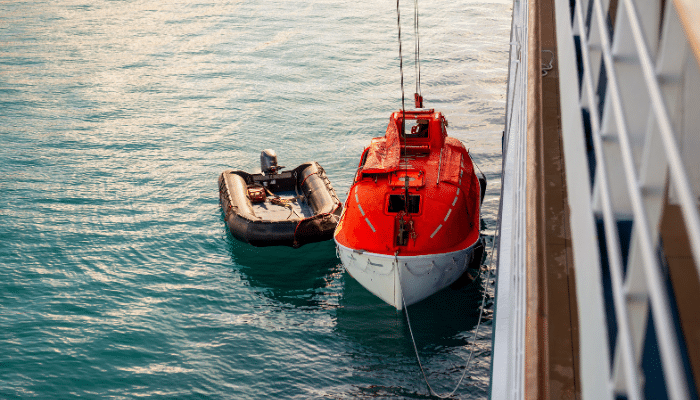10 Things Seafarers Must Remember Before Signing Off From Ship
The day of the sign off from the ship is probably the most joyous, adrenaline fueled, hectic as well as emotional for each and every sailor. The days leading up to sign off consists of sleepless nights, relentless packing and a constant state of euphoria! After all, only a seaman can understand what it is to be going home after a long and tedious stint at sea.
However, in the process, seafarers tend to ignore the essential things that are imperative to the signing off. Documents, money and other such aspects become secondary in the rush to get home. Not to forget, the hectic workload at the port of sign off until one’s reliever is onboard makes that day all the more intense.
Thus, in order to ensure that the seafarers enjoy the sign off process without jeopardizing what is essential, a few important points must not be forgotten:
1. Passport and CDC
The two most important documents for any seafarer – passport and CDC, ought to be checked thoroughly when receiving from the master. Checking their physical conditions (for any damage) is necessary to avoid any complications at the airport. The stamp indicating the sea service must be checked in the CDC. A seaman must never forget that without these two booklets, it is impossible to conduct any personal or professional work pertaining to one’s sea career.
2. Other Important Documents
Other documents that have been handed over to the master at the time of joining, such as the yellow fever vaccination certificate, STCW certificates etc. must be checked for and received. As is with the Passport and the CDC, these documents also form the pillar of a seafarer’s essential paperwork, and therefore must be tended to.
The travel tickets must be checked for accuracy. Check the travel itinerary, including boarding, departure and arrival timings, seating details and all aspects of the travel. Tally your name on the ticket with that on your passport and double check if it is spelt exactly like it shows on your passport. Ensure that you write down your company’s agent’s number for any questions/help. Any paperwork with regard to your exit visa and immigration process must be checked very thoroughly. Remember that you’re signing off in an alien country wherein you must have all your documents in order to prevent any scope of unnecessary interrogation.
3. Sea Service Letters
This aspect is very important from one’s career point of view. Sea service letter and testimonial spanning your time of service for the ongoing contract should be taken from the Master. Check the letter for the appropriate signatures and stamps wherever required. Check if the dates, COC number and statement of conduct and sobriety are duly filled and accurate. In the haste during sign off, a lot of people forget to check such details; hence it is best to get this sorted out one day prior to the sign off.
4. Cash
Everyone wants to get their hands on the most important thing in while signing off- money! Any balance that is due/cash advance that has been asked for must be counted and received (along with the pay slip). Needless to say, a little money is always handy at the airport to buy all those things from the duty Free and spend a little of those hard earned dollars on some good food! Cross checking with the pay slip must be done to ensure that all transactions are clear and any duly payable amount has been cleared.
[the_ad id=’172861′]
5. Official Packages
At times, the master may hand over a package to be delivered to the company. In that case, personal judgment must be applied. If taken, it becomes your responsibility to hand it over unscathed and in proper condition. In that case, make sure the package that you take is checked for any tampering in order that you’re not blamed afterwards for unseemly wear and tear. Onboard, it becomes very clear on a day-to-day basis as to how important responsibility is when delegated to.
6. Unofficial Packages
Often, a crew member may ask you to deliver a package or an envelope to their family and/or friends. Again, personal discretion is of utmost importance here with regard to trustworthiness. Explain to the person (politely, of course) that there’s always a chance that one could get interrogated for carrying something that doesn’t belong to them. So keeping that in mind, (if you still feel obligated to deliver it) open it and check the contents thoroughly. This does not mean disrespecting the person by reading his personal letter but what it does mean is going through the contents in general looking out for any contraband and other illegal substances.
Related reading : 10 Professional Mistakes Seafarers Must Not Make Onboard Ships

To ensure that you don’t have to flip through all your papers in case any authority (airport, customs etc.) asks for a certain document, keep everything handy and ready in your hand baggage. Keep photocopies of all your documents because you never know when the necessity to have a copy arises.
Keep all your documents in your hand baggage; this is a common practice among all seafarers because there have been instances (very less probability) that the main luggage has been lost in transit. It might be paranoid thinking, but in case your certificates are in your main luggage and it gets lost, you’ll know how much of a pain (and how time consuming) it’ll get to obtain the originals all over again. Better safe than sorry!
Check your baggage weight onboard itself. The galley department has a weighing scale almost always, so make sure that your baggage does not exceed the permissible amount (its generally 40 kilos for foreign travel, with the maximum on one bag capped at 23 kilos). However, every airline has its own policy, so remember to ask the agent for the permissible baggage limit.
Need more traveling tips to ensure your safety? Read our ebook
8. Know the Local Laws
In all like-ability, a seafarer signs off at a country he is not a citizen of. In that case, know the local laws and customs and respect them. For example, Singaporean authorities are very strict with respect to pirated CDs (Your immigration document generally contains a warning against the carriage of these objects). Ensure that you do are not carrying any of them.
Some nations have a limit on the amount of cash you can carry. Once again, ask the agent for any such information that may of importance to your repatriation.
Related Reading – 7 Problems Seafarers Can Face While Traveling to Foreign Land
[the_ad id=’173168′]
9. Handing Over Report
All the above points have been aimed at safeguarding one’s own interest. This point is to emphasize on the need to ensure that your reliever is not left in the dark with respect to his duties.
Prepare the Handing Over Notes well in advance. For obvious reasons, there will be no time for last moment explanations to the reliever regarding his responsibilities and duties. So, prepare a comprehensive and informative document to facilitate a smooth transition and to cancel out any unnecessary confusion. It is a very important responsibility of every officer to make the on signer feel at ease with his duties. Acting selfish and engrossed in the sign off process is obvious, but not at the cost of jeopardizing the safety of the ship and its personnel. Take time out and let the on signer clear any looming doubts that may exist regarding the ship or his duties. Take him around and show him what lockers he is in charge of, point out the maintenance that needs to be carried out and acquaint him with the ways of the master and the other personnel onboard.
10. Handing Over Your Cabin
You have lived in the cabin the way you’ve wanted to. And there is no doubt that it was a comfortable little abode of your own; your very own place of Zen after a day’s hard work. So why not leave it like that for the next person. Although it is the job of the Steward to arrange the cabins up to a mark, there is not much an effort required to clear out the trash a day before signing off, arranging the bed a little, and maintaining a general sense of order in the cabin. Also, make sure you have checked the cabin throughly to avoid forgetting any belongings.
This aspect is not really important to any duty or responsibility. However, it is indeed important to the perception of the on signer of you. A clean cabin that is being handed over automatically calls for a little respect which makes the transition all the more easier. It doesn’t really require much effort to clean up one’s living space for the next person and in return it makes the other person a lot better. A dump of a room, however, gives out a bad vibe to a person that is about to spend the next few months of his life in that little area.
To conclude, the day of the sign off is the happiest day in a seafarer’s life and it should be kept that way. As long all your identifications, documentations and other things are in order, you can be assured that your sign off will be free of any worry. So adhere to common process and rejoice in the anticipation of reuniting with your friends and family. After all, you deserve to be back home and enjoy your hard earned money in the things and with the people that you love.
You may also like to read –
Do you have info to share with us ? Suggest a correction
Latest Ship Safety Articles You Would Like:

About Author
Shilavadra Bhattacharjee is a shipbroker with a background in commercial operations after having sailed onboard as a Third Officer. His interests primarily lie in the energy sector, books and travelling.
Subscribe To Our Newsletters
By subscribing, you agree to our Privacy Policy and may receive occasional deal communications; you can unsubscribe anytime.
Web Stories


























Nice piece
I am ITF Inspector Sri Lanka. This sight very useful for my work ,
Very important & useful topic.
It is a good subject as a reminder for senior crew and useful for senior ones .
It is worth reading and professional job .
Thanks
CDC of course refering to Continuous Discharge Certificate, or Seaman Service Book in other part of the world outside Bharat.
The sight, gives those serving at sea teaching which is useful
I’d always received very nasty cabins on my sign off. Disgusting girls, no education at all!
I have worked for many cruise lines and this is very good advice. I will say this. be careful with P&O cruise lines as they do not adhere to #4 and will pay you at months end after you have left the ship meaning any errors must be taken up with the office or upon your return to the vessel you have left. it makes for very had communication and gettting issues resolved. I suggest it is best practice to steer clear of any company that does that. Cash owed should always be paid out before leaving the vessel. they don’t allow us to leave vessels owing anything on our onboard accounts, they don’t allow PAX to leave owing their onboard account. The staff and crew should be afforded the same treatment.
These are important things.we have to keep in our mind before leave the ship.
One should remember to inform family you’re coming back home (date, time, etc.) 😉
Love and really like to join…
I am still trying to join the marchant marine.. i must confess that it has’nt been an easy race. As the name suggests, marine insight has been very insightful for me. i read alot from here, know alot, and of course can actually talk like a seafarer already.
You are really doing a great job here. More grease to your elbows.
Regards
Thanks
the exhaustion and fatigue a seaman leaves behind is in comparable.he looks forward to see people who really understand his predicament,by serving at sea leaving behind all material and personal comforts,but sad to see most of the seamen get exploited by the near and dear ones.this is apart of life which a seaman has to tread carefully.
Thank You for this good rules!
All those and twenty other things as well. Oh and most important your flight details, your mobile phone fully charged.
I sd/off on 12/3/15. I was M/O on board of Indian flag ncv/ht vessel. I didn’t take sea service letter. It was not included in s/FF checklist either. Other documents are in order. Would it cause difficulty on my next step/on?
Please. Advice
@Dr.Amitabh: The sea service letters are important when applying for competitive examinations. You can join a vessel without them…don’t worry.
The best place I well love I mean love to work on a ship
Hello guys my name is pradeep tanwar i am from hriyana i complete my gp course 2015 but i still waiting for jobless my all document complete my family not able to pay money to any agent my my agent also cheat me please tell me any sugestion pradeeptanwar150@gmail.com please please
What should be done in case you forget one of your baggages containing important documents back at the ship?
Please help
Contact your company officer and inform about your documents. They can easily arrange their retrieval via an agent and later on, it can either be sent by post or in person during sign off of a crew.
I lost my article of agreement copy.
How can i get my article of agreement of indian flag ships from my shipping office.
Please advice.
@Joseph: You need to ask your company as only they can assist you with this.
I need to know how my husband will sign off . he gone for 5(-/+) months contract as second engineer.Now 7th months completed.Still company not willing to sign off .We also placed my surgery as emergency still nothing going on .Only information from company that they consider our case and process,but now ship in port for 5 days and we contacted for last 15 days as emergency still nothing happened .They only tell false thing.
Which company your husband is working?
SIR,
MY FRIEND ON BOARD SECOND OFFICER AND HIS INDIAN PASSPORT EXPIRING ON 15 JUNE 2020. DUE COVAID -19 NO SIGN ON SIGN ON.
WHAT IS NEXT ACTION TO DO TO UPDATE HIS PASSPORT VALIDITY.
Tell him to contact the company as Sign off has started.